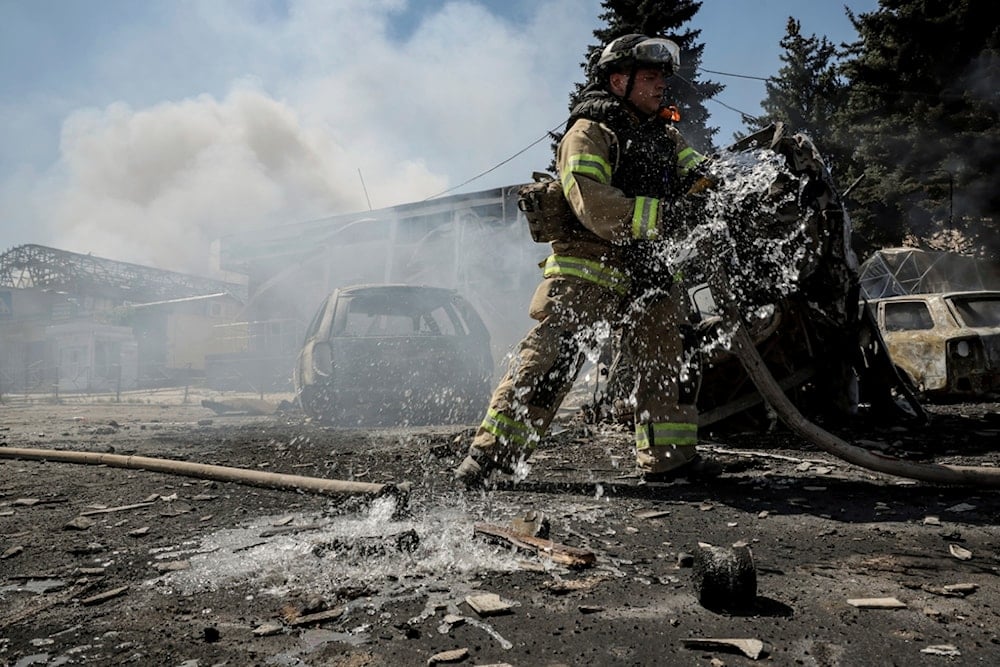UK: No Ukraine-Russia peace deal expected in next 12 months
UK's David Lammy says Ukraine-Russia peace talks may continue into 2026, while Putin insists on open-ended negotiations based on the 2024 peace framework.
-

In this photo provided by Ukraine's 24th Mechanized Brigade press service, a firefighter puts out the fire after a Russian drone hit the market in the town of Druzhkivka, Donetsk region, Saturday, August 2, 2025 (AP)
UK Foreign Secretary David Lammy stated on Saturday that a peace agreement between Russia and Ukraine remains unlikely over the next 12 months, despite ongoing diplomatic efforts.
“I suspect that in a year’s time, talks will be going on. The question is how serious Russia is about those talks,” Lammy told The Guardian, expressing skepticism over Moscow’s willingness to reach a resolution.
The United Kingdom has consistently reaffirmed its commitment to backing Ukraine, maintaining that it will continue its support “for as long as needed” in the face of Russia’s military campaign.
Russian President Vladimir Putin, speaking on Friday, reiterated Moscow’s stance on a political settlement based on the framework proposed in the summer of 2024. Putin said Russia is prepared to wait for Kiev’s readiness to re-engage and emphasized the need for open-ended discussions aimed at achieving lasting peace.
While no comprehensive agreement has yet been reached, Russia and Ukraine have previously held three rounds of negotiations in Istanbul. These talks led to a prisoner exchange and the mutual presentation of draft settlement memorandums.
Russia outlines ceasefire conditions
The Russian Ministry of Defense revealed in May the conditions presented by Moscow during the Istanbul negotiations with Kiev, as shared by the Clash Report platform on social media.
The outlined terms reflect Russia’s position on a potential settlement in Ukraine, with an immediate ceasefire as the primary demand.
Russia's ceasefire conditions
Neutrality modeled on Austria
The first condition proposed by Moscow is that Ukraine adopt a neutral status, similar to Austria’s model. This would prohibit the presence of foreign troops or non-Ukrainian military bases on Ukrainian territory, effectively excluding NATO or other military alliances from operating within the country.
No foreign troops or bases in Ukraine
Moscow emphasized that neutrality must be comprehensive, with Kiev legally committing to reject the stationing of foreign forces and equipment.
Territorial demands and border recognition
Among the key demands, Russia requires Ukraine to formally recognize its constitutional claims over five regions: Donetsk, Lugansk, Kherson, Zaporizhzhia, and the Crimean Peninsula.
The Russian Defense Ministry stressed that the immediate ceasefire is contingent upon the complete withdrawal of Ukrainian forces from all five regions claimed by Russia.
Renunciation of war compensation claims
Moscow is also seeking a mutual legal renunciation of any compensation claims related to war losses, including economic damage and human casualties.
Protection of Russian-speaking citizens
Russia demands that Ukraine commit to European standards on minority rights, specifically to safeguard the rights of Russian-speaking citizens. In addition, Moscow calls for an end to what it terms “nationalist propaganda” within Ukrainian society.

 4 Min Read
4 Min Read









